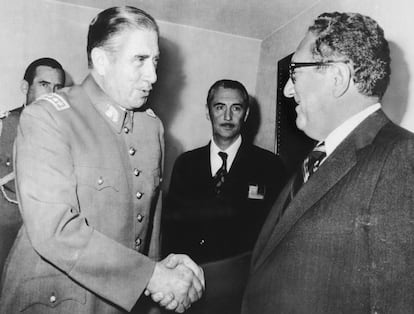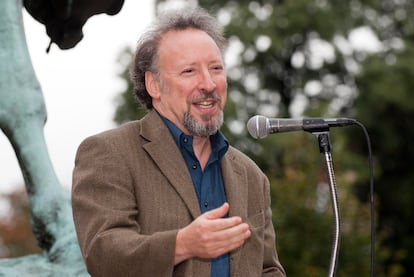Peter Kornbluh, analyst at the National Security Archive: ‘Chile is Kissinger’s Achilles heel’
The expert believes the U.S. involvement in the 1973 coup is a blemish on the former statesman’s legacy: ‘It’s a story that has haunted Kissinger’s legacy and will now haunt his ghost’


Peter Kornbluh is a Chile expert at the National Security Archive, a non-profit research and archival institution located on the campus of the George Washington University in Washington, D.C. For years, Kornbluh has been digging through declassified documents about U.S. involvement in the overthrow of the socialist government of Salvador Allende and its support for the dictatorship of Augusto Pinochet (1973-1990). Henry Kissinger, who recently died at the age of 100, is key to understanding the U.S. role in Chilean politics because he was the Secretary of State (1973-1977) and National Security Advisor (1969-1975) under Presidents Richard Nixon and Gerald Ford. Kornbluh is thoroughly familiar with Kissinger’s ties with Chile because he and his organization have analyzed all the documents declassified by the United States after Augusto Pinochet’s 1998 arrest in London.
The author of The Pinochet File: A Declassified Dossier on Atrocity and Accountability said, “It’s a story that has haunted Kissinger’s legacy and will now haunt his ghost.” Kissinger was a man “whose historical brilliance was never able to conceal his profound moral wretchedness,” wrote Chile’s ambassador to the U.S., Juan Gabriel Valdés, on X (formerly Twitter).
Question. How significant was Kissinger for Chile?
Answer. He played a very significant role in shaping relations with Chile and was a central figure in U.S. foreign policy. Kissinger was a major player in destabilizing the elected government of Salvador Allende and supporting Augusto Pinochet’s regime, which led to a 17-year military dictatorship. His influence and control had a profound impact on U.S. foreign policy in Chile.
Q. What was Kissinger’s role in the overthrow of the Allende government?
A. Among the American officials involved –—President Richard Nixon, National Security Advisor Henry Kissinger, CIA Director Richard Helms and other intelligence officials — Kissinger is most closely associated with the United States’ efforts to overthrow the Allende government. Chile represents a significant blemish on Kissinger’s reputation and legacy, which he carefully cultivated. We know this because of the detailed and revealing declassified documentary record that spotlights his role in leading a policy of intervention against Allende and recognition of the Pinochet regime.
Q. Would there have been a coup without Nixon and Kissinger?
A. I can only speculate. Several factors influenced the coup d’état in Chile. Declassified documents reveal that U.S. policy, personally crafted by Henry Kissinger, aimed to destabilize and undermine the Allende government. Kissinger himself stated in a telephone conversation with Richard Nixon that the goal was to create favorable conditions for Allende’s overthrow. After the coup, Kissinger and Nixon congratulated each other, considering it an achievement, and were unhappy about the lack of media recognition. Kissinger remarked that they would have been hailed as heroes in the Eisenhower era. While some may portray Kissinger as a hero after his death, history clearly shows that he did not represent the best of America, but rather the worst.
Q. What impact did Kissinger’s role in Chile have on his own life?
A. He tried to rewrite his role in Chile’s history in his extensive memoirs. Through his lawyer, he attempted to discredit an entire episode of my book by selectively sharing documents with a conservative journalist. However, historical evidence has debunked his narrative about Chile. In his memoirs, he claimed to have met with Pinochet in 1976 and discussed democracy and human rights. Yet, we obtained declassified cables of their conversation which reveal the exact words they exchanged, contradicting his self-portrayal in history.
Q. Did Kissinger ever comment publicly on the coup in Chile once he was out of government?
A. In a well-known interview with Elizabeth Farnsworth of the PBS NewsHour — in 1999 or 2000 — she asked why he didn’t confront Pinochet about human rights violations during their meeting. Kissinger replied something to the effect that human rights were not an issue in those days. He defended his policies and actions throughout the entire interview. But everything Kissinger did to help Pinochet finally forced the U.S. Congress to say enough is enough. Congress enacted foreign policy legislation — I call it the Kissinger-Pinochet legislation — that for the first time made human rights a criterion for direct U.S. economic and military aid, and financial aid from multilateral banks. All those laws were created because of Kissinger’s involvement in supporting Pinochet’s coup, even though there was overwhelming evidence of human rights abuses in Chile.

Q. You read and analyzed hundreds of classified files on the coup. What caught your attention the most?
A. During the maneuvering to overthrow Allende, Kissinger’s role in General René Schneider’s [commander-in-chief of the Chilean army] assassination was atrocious. The documents are both compelling and terrifying. After the coup, Kissinger sent a CIA emissary — Vernon Walters — to discreetly support the Pinochet regime. This support ultimately led to the formation of DINA, Pinochet’s feared secret police. Kissinger also blocked formal diplomatic inquiries from foreign nations about Operation Condor [a United States-backed campaign of political repression and state terrorism in South America]. Those inquiries could have prevented an act of international terrorism on the streets of Washington that claimed the lives of Orlando Letelier [Allende’s foreign minister, who was assassinated in September 1976] and his colleague, Ronni Moffitt. The Kissinger era is very significant for Chile — it’s a story that has haunted Kissinger’s legacy and will now haunt his ghost.
Q. What did Kissinger do about the damaged U.S.-Chile relationship after leaving office?
A. After leaving office, Kissinger seemed to intentionally distance himself from Chile. Congressional committees and investigations into Operation Condor took place, but he managed to avoid them all. However, he remained a significant figure in U.S. foreign policy, exerting influence for four more decades. He achieved legendary status within American foreign policy circles. Fortunately, the well-documented historical record has revealed his true legacy, which was not at all positive.
Q. How would you describe the relationship between Kissinger and Pinochet?
A. Both Kissinger and Pinochet understood the exercise of pure power. Kissinger didn’t personally direct torture and murder, but he did authorize the bombing and killing of innocent civilians in Vietnam, Cambodia and Laos. Both abused their power and violated human rights on a large scale, although Kissinger’s involvement was more indirect than Pinochet’s. While Pinochet was widely condemned worldwide, Kissinger was praised as a skilled statesman. However, a careful review of the news coverage of Kissinger’s death now reveals a more nuanced discussion of his controversial legacy. Kissinger’s association with Pinochet had a negative impact on his reputation.
Q. What was Kissinger’s approach to Pinochet’s dictatorship after the coup?
A. When Pinochet’s forces began killing people in the days following the coup, Kissinger’s aides informed him of reports indicating 10,000 casualties. Although these figures were exaggerated, they reflected the reality of mass killings post-coup. Kissinger made it clear that the new government served the interests of the United States better than the previous one, and that they would not hold Pinochet accountable for human rights violations. This policy prevailed not because of a personal relationship between Pinochet and Kissinger, but because Kissinger wanted to eradicate the Allende model and make sure it was not emulated by other countries. He was comfortable with the model of a fascist military regime in Chile, which eventually prevailed in Argentina and Uruguay, and was already in place in Brazil.
Q. How does Kissinger’s death make you feel after spending so much time reviewing the declassified files?
A. Over time, we have had more and more opportunities to shine a spotlight on Kissinger’s legacy, and his death may be our last chance to do that. It’s certainly the end of a significant and controversial era, but I believe there will be an ongoing global debate about his legacy. I’m proud of the effort we have made at the National Security Archive to obtain and declassify Kissinger’s documents, including his communications, transcripts of private conversations, and interactions with various officials. The accessibility of this material greatly contributes to an objective, historical evaluation of Kissinger’s contentious legacy.
Sign up for our weekly newsletter to get more English-language news coverage from EL PAÍS USA Edition
Tu suscripción se está usando en otro dispositivo
¿Quieres añadir otro usuario a tu suscripción?
Si continúas leyendo en este dispositivo, no se podrá leer en el otro.
FlechaTu suscripción se está usando en otro dispositivo y solo puedes acceder a EL PAÍS desde un dispositivo a la vez.
Si quieres compartir tu cuenta, cambia tu suscripción a la modalidad Premium, así podrás añadir otro usuario. Cada uno accederá con su propia cuenta de email, lo que os permitirá personalizar vuestra experiencia en EL PAÍS.
¿Tienes una suscripción de empresa? Accede aquí para contratar más cuentas.
En el caso de no saber quién está usando tu cuenta, te recomendamos cambiar tu contraseña aquí.
Si decides continuar compartiendo tu cuenta, este mensaje se mostrará en tu dispositivo y en el de la otra persona que está usando tu cuenta de forma indefinida, afectando a tu experiencia de lectura. Puedes consultar aquí los términos y condiciones de la suscripción digital.








































